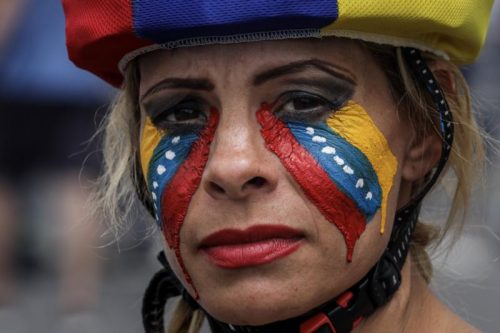The St. Cloud Diocese has a longstanding relationship with Venezuela — a 50-plus-year partnership of sending and receiving priests, religious and lay people between the two countries.
Despite its best efforts, the St. Cloud Mission Office has experienced difficulty in communicating with our sister Diocese of Maracay, Venezuela, as the country’s political turmoil has worsened.
“We continue to hear — in what is said and in what cannot be said — that the people of Venezuela are in a crisis situation,” said Kateri Mancini, mission education coordinator for the diocese.

“From a lack of basic needs such as food, medicine and toilet paper to violence and crime increasing throughout the country, there is both great fear and great need. Our partners continue to ask for our prayers. But they also continue to express their love for us, and especially their love and hope in the Lord. They have so much to offer us and our global church, even in this ongoing time of struggle for them.”
Most notably, the Mission Office strives to communicate with Maracay’s Bishop Rafael Conde, who has tentative plans to visit Minnesota this fall.
“Our most recent contact with Maracay has been from Bishop Conde, expressing regret that he cannot confirm his pending travels to Minnesota yet because of possible changes to the country’s constitution pending the election that took place on July 30,” Mancini said.
“In this, and so many other communications from Bishop Conde, as well as other friends in Maracay, he also expressed an increasingly difficult situation in the country, ‘a crisis every day worse,’ per his last email on July 26 and asked for prayers.”
Mancini notes that it is important for the people of the Diocese of St. Cloud to be aware of the situation, and to advocate “when and how we can for our brothers and sisters there, as with all our global family in situations of suffering.”
‘Trying to survive’

Father Omar Guanchez, pastor of St. Mary of Mount Carmel in Long Prairie, is originally from Maracay and was ordained for the Diocese of St. Cloud in 2009. Much of his family still lives in Venezuela.
“Both of my parents, my two sisters and two nieces are in Venezuela. They struggle every day to find basic goods, like everyone else,” Father Guanchez said. “Thanks be to God, my relatives don’t have any serious health problems, because that would make it even harder for them since it is difficult to get medicines and quality health care. Everybody suffers as they see prices rising weekly and the crime rate going up because people are trying to survive.”
Father Guanchez said the biggest challenge the citizens of Venezuela are facing now is the uncertainty about the future.
“Not knowing what is going to happen is a dreadful thing. The future of the country looks dim, that’s why over two million Venezuelans, mostly young people, have left the country in the last 10 years,” he said.
His greatest hope for his family and the people of Venezuela is that “they might be well and happy.”
“Prayer is powerful. Venezuela has been humbled by this crisis, which is the worst crisis in our history, and so we need all the prayers that could be said for that ‘change’ to happen as soon as possible. We want God to pose his eyes on Venezuela and show us his great mercy. Venezuelans, like anyone else in the world, have life dreams and they want peace and a happy life.”
Bishop Donald Kettler echoed Mancini and Father Guanchez and emphasized the great need for prayer.
“Prayer is the cornerstone of our faith and the first action we should take, whether in times of gratitude or in times of difficulty,” he said.
“Prayer is the place to start.”
If people are looking for more actions, Bishop Kettler suggested offering sacrifices that reflect the plights of the Venezuelan people. Ideas include walking, biking or carpooling to work, letting someone go ahead of you in the grocery store line or fasting.
“It could be something as simple as skipping that morning cup of coffee,” he said. “Our sacrifices offered to God on behalf of the suffering people in the world can do so much in showing our concern and sharing in the difficulties others are experiencing.”






















